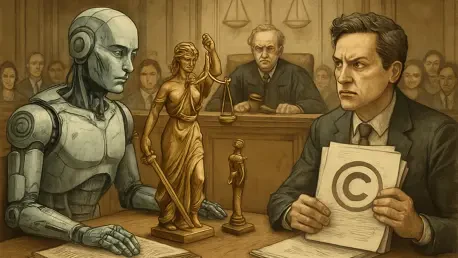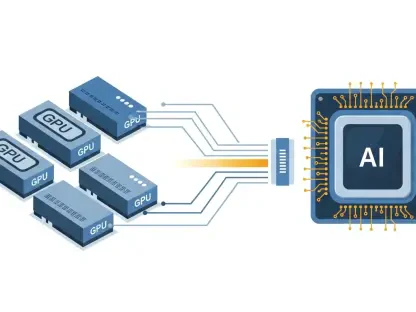In today’s discussion, we have Laurent Giraid, an expert on AI with a keen interest in the legal and ethical dimensions of this transformative technology. As AI continues to intersect with various industries, it raises significant concerns about intellectual property rights, as seen in the recent lawsuit from Disney and Universal against AI company Midjourney. This case has captured significant attention as it marks the first major legal clash between Hollywood studios and an AI firm, bringing to light vital issues of copyright in the digital age.
Can you explain the main reasons behind Disney and Universal’s decision to file a lawsuit against Midjourney?
Disney and Universal believe that Midjourney has repeatedly infringed on their copyrighted works by using them without permission. Midjourney’s AI image generator allegedly creates numerous copies of iconic characters from the studios’ films, thus appropriating their intellectual property unlawfully. This legal action serves as a significant countermeasure, aimed at protecting their creative assets from unauthorized replication in the world of generative AI.
How successful has Midjourney been in terms of revenue, and what does that imply about the scale of its operations?
Midjourney reportedly generated substantial revenue, hitting $300 million last year through its paid subscriptions. This figure underscores not only the company’s financial success but also the broad appeal and extensive customer base that its services have garnered. It also indicates the considerable scale and reach of its operations, illustrating how pervasive their technology has become across different industries and user groups.
What specific allegations are Disney and Universal making regarding the infringement of their copyrighted characters?
The lawsuit accuses Midjourney of pirating works from the studios to train its AI models. The technology then uses these models to produce high-quality images that prominently feature recognizable characters such as Darth Vader, Elsa, and the Minions. The studios argue that this involves substantial copying of materials without appropriate authorization, portraying Midjourney as a ‘copyright free-rider’ that profits from creative works it did not originate.
How did Midjourney respond to the initial concerns raised by Disney and Universal about copyright infringement before the lawsuit was filed?
According to the lawsuit, Disney and Universal reached out to Midjourney with their concerns and sought to have the company implement protective measures similar to those adopted by other AI firms. However, the studios claim that Midjourney ignored these requests, continuing to focus strictly on its commercial interests without altering its practices to address the alleged infringements.
Can you describe some examples of the alleged infringement involving Disney and Universal characters?
The lawsuit provides vivid examples of what they consider infringements, showing images generated by Midjourney’s AI that include beloved characters like Yoda wielding a lightsaber, Bart Simpson skateboarding, or Groot and Shrek being featured without the consent of their respective rights holders. These instances illustrate the tangible impact that such technological practices have on the integrity of the studios’ intellectual properties.
What protective measures have other AI companies adopted to address similar copyright concerns, and how has Midjourney’s approach differed?
Other AI companies have taken proactive steps by incorporating more robust copyright detection and protection systems into their workflows, perhaps using watermarking or user access limitations to manage similar concerns. Midjourney’s approach, as described in the lawsuit, seems less stringent, with the company continuing to develop more sophisticated versions of its AI services without reportedly implementing these additional safeguards.
What kind of legal precedents exist in terms of copyright infringement cases involving AI companies?
Legal precedents in this realm are still in their infancy but growing. Last year, a federal judge in California allowed a copyright suit against Midjourney and other AI companies to proceed, finding that artists had a valid argument that their works had been copied and stored without permission. This and other emerging cases are beginning to lay the groundwork for how courts might interpret and enforce copyright law in the context of AI-generated content.
What are Disney and Universal seeking in terms of monetary damages and legal remedies in this lawsuit?
Disney and Universal are seeking unspecified monetary damages, likely intended to recover losses they attribute to the unauthorized use of their intellectual properties. Moreover, they are asking for a preliminary injunction to halt Midjourney from further copying their works or offering its services without proper copyright protections, aiming to prevent ongoing and future infringements.
How might this lawsuit impact the operations or business model of Midjourney moving forward?
This lawsuit could significantly pressure Midjourney to alter its operational practices, potentially by incorporating more comprehensive copyright management and compliance strategies. If the injunction is granted, Midjourney might also need to pause certain functionalities of their service, potentially slowing down their product rollouts or scaling back their offerings.
What potential effects could this lawsuit have on the broader generative AI industry?
This lawsuit exemplifies the complex interplay between cutting-edge technology and existing legal frameworks, serving as a cautionary tale for the AI industry at large. It could lead to stricter regulations or more vigilant scrutiny of how AI companies use copyrighted materials. Ultimately, it may push the industry towards innovating in compliance measures as much as in technological advancements, to safeguard against similar legal challenges.









